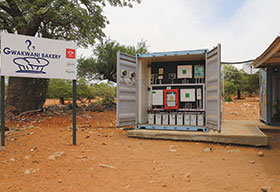

Despite being ranked as the eighth most developed country in Africa in the United Nations Development Programme’s annual report in 2018, several challenges still plague South Africa.
The need for employment, access to energy, economic activity, community development and access to affordable essential foods is still very prominent in both rural and urban areas.
While working on a project to empower a remote village in the northern part of South Africa through locally available renewable energy sources, Profs Johan Meyer and Sune von Solms of the University of Johannesburg’s (UJ) School of Electrical and Electronic Engineering Sciences conceptualised the Solar Bread Box – a first for commercial sized photovoltaic solar bakeries.
Boasting the same equipment and baking cycle as a standard grid tied commercial bakery, the Solar Bread Box eliminates the dependence, purchase and monthly bills associated with grid tied electricity. Not only that, but the bakery is also an instantaneous employment and skills development opportunity for youths, a tool for economic stimuli and an avenue for an essential product.

Low income households in rural and urban communities where there is no grid connection; communities where the residents cannot afford electricity; or communities where there are underlying social issues regarding the access and distribution of electrical power consider bread an everyday staple. The affordability and access of wholesome, fresh bread is essential in such areas.
Prof Meyer clarifies that the Solar Bread Box should not be confused with other solar solutions such as concentrated solar power or solar thermal technologies that are used for heating and cooling. He explains that this solution uses a photovoltaic system, which converts solar energy into electrical power used for the baking process.
Prof von Solms says that the idea is for the bakery to function on the conversion of solar energy as much as possible – minimising the cost of solar energy storage solutions. This means that baking will be seasonally dependent, and bakers will have to adjust their baking times in accordance with the sun to harness maximum power during baking cycles.
The UJ School of Electrical Engineering, in collaboration with Bakery and Food Technology Incubator of South Africa (BICSA), offers training on how to bake, how to run a bakery as a business and how to maintain a solar PV system, enabling communities to thrive independently.
So far, the Solar Bread Box has sparked economic activity, created jobs for eight individuals, created an enterprise that now serves neighbouring villages, enabled access to wholesome foods and the production of at least 100 loaves of bread a day, and boosted skills development in Gwakwani – a small, remote village in Limpopo that initially had no grid connection.
When used as a tool for community development, the Solar Bread Box becomes a self-sustaining, economy stimulating, job creating and skills development platform – creating communities that have access to healthy, wholesome baked goods, are self-dependent and economically active.
For more information contact Cornay Keefer, University of Johannesburg, [email protected]
© Technews Publishing (Pty) Ltd | All Rights Reserved